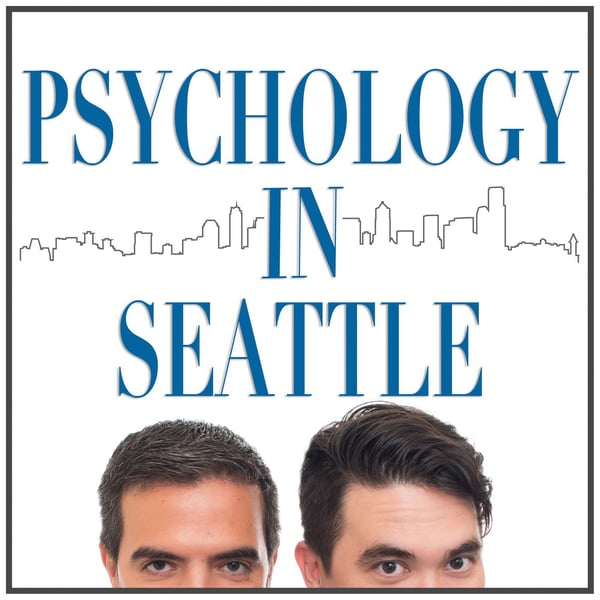Hoarding Disorder (2016 Rerun)
Psychology In Seattle Podcast
Kirk Honda
4.6 • 1.2K Ratings
🗓️ 17 April 2021
⏱️ 24 minutes
🧾️ Download transcript
Summary
Become a patron: https://www.patreon.com/PsychologyInSeattle
Email: https://www.psychologyinseattle.com/contact
Get merch: https://teespring.com/stores/psychology-in-seattle
Dr. Kirk’s Cameo: https://www.cameo.com/kirkhonda
Instagram: https://www.instagram.com/psychologyinseattle/
Discord: https://discord.gg/6QR4sE8x9K
Reddit: https://www.reddit.com/r/PsychologyInSeattle/
Twitter: https://twitter.com/PsychInSeattle
Facebook Official Page: https://www.facebook.com/PsychologyInSeattle/
Facebook Fan Page (run by fans): https://www.facebook.com/groups/112633189213033
The Psychology In Seattle Podcast ®
Trigger Warning: This episode may include topics such as assault and discrimination. Listeners are encouraged to refrain from listening and care for their safety and well-being.
Disclaimer: The content provided is for educational, informational, and entertainment purposes only. Nothing here constitutes personal or professional consultation, therapy, diagnosis, or creates a counselor-client relationship. Topics discussed may generate differing points of view. If you participate (by being a guest, submitting a question, or commenting) you must do so with the knowledge that we cannot control reactions or responses from others, which may not agree with you or feel unfair. Your participation on this site is at your own risk, accepting full responsibility for any liability or harm that may result. Anything you write here may be used for discussion or endorsement of the podcast. Opinions and views expressed by the host and guest hosts are personal views. Although, we take precautions and fact check, they should not be considered facts and the opinions may change. Opinions posted by participants (such as comments) are not those of the hosts. Readers should not rely on any information found here and should perform due diligence before taking any action. For a more extensive description of factors for you to consider, please see www.psychologyinseattle.com
This show is part of the Spreaker Prime Network, if you are interested in advertising on this podcast, contact us at https://www.spreaker.com/show/3269717/advertisement
Transcript
Click on a timestamp to play from that location
| 0:00.0 | Hello, and welcome to the Psychology and Seattle podcast. I'm your host, Dr. Kirk Honda. I am chair of the couple and family therapy program at |
| 0:08.8 | Antioch University, Seattle, and I'm also a licensed therapist. |
| 0:13.2 | Today on the podcast, we have a special guest, Dr. Jennifer Sampson. She's gonna talk about her |
| 0:20.8 | specialty, which is hoarding disorder. |
| 0:23.7 | Tell us or introduce yourself, please first. Yeah, hi. I'm Jennifer Sampson. |
| 0:28.7 | I'm core faculty with you at Antioch University, and I'm also the executive director of the hoarding project. |
| 0:35.1 | So tell us about hoarding disorder and the hoarding project and everything you know about it. |
| 0:41.2 | All right, so hoarding disorder is a brand new mental health diagnosis. So two years ago, in 2013, our |
| 0:49.2 | the latest version of our diagnostic manual came out and in it, hoarding disorder showed up for the first time. |
| 0:54.8 | So prior to this, it was like non-existent in mental health, like conversation. |
| 1:01.0 | But a task force basically was put together to research this behavior that was really kind of surfacing in coming to public attention, |
| 1:11.2 | like via reality television, for instance, |
| 1:15.2 | in a way that these different types of behavior sort of hung together in a diagnostic kind of way. |
| 1:22.2 | So hoarding disorder, we define as having four main parts to it, first that there's an excessive acquisition of stuff. |
| 1:30.6 | So people are bringing in more things and they have space for need for or resources for. |
| 1:36.9 | Not everybody who hoards excessively acquires, but most people do, like 70% of people who would meet clinical criteria |
| 1:43.8 | for hoarding would excessively acquire. How do you define excessive? |
| 1:48.4 | Above their needs space or resources for stuff. |
| 1:53.8 | Above their needs space. So they have too much stuff given the amount of space they have. |
| 1:59.1 | Yeah, yeah. And so like people, and they also don't need all that stuff. |
| 2:03.2 | They don't need it all, right? So I mean, we all have stuff we don't need, right? Like that's fine. |
| 2:09.8 | But hoarding really kind of boils down to like functionality of space in a lot of ways. |
... |
Please login to see the full transcript.
Disclaimer: The podcast and artwork embedded on this page are from Kirk Honda, and are the property of its owner and not affiliated with or endorsed by Tapesearch.
Generated transcripts are the property of Kirk Honda and are distributed freely under the Fair Use doctrine. Transcripts generated by Tapesearch are not guaranteed to be accurate.
Copyright © Tapesearch 2025.

